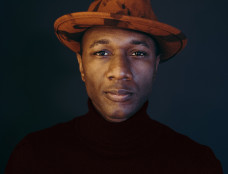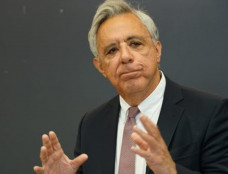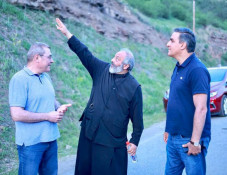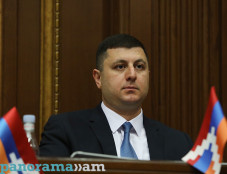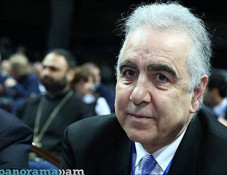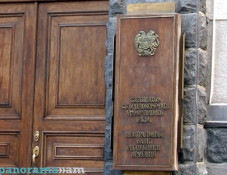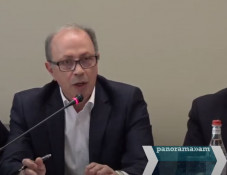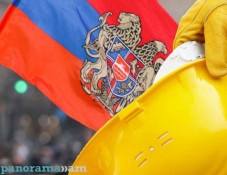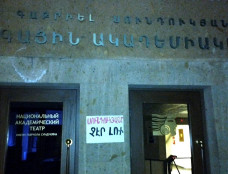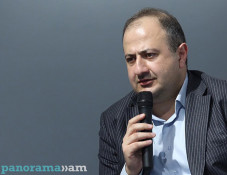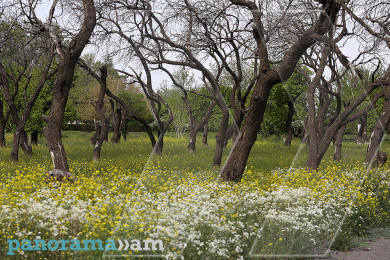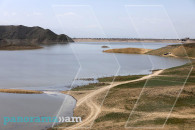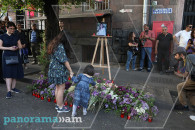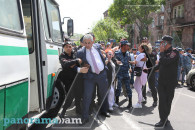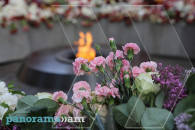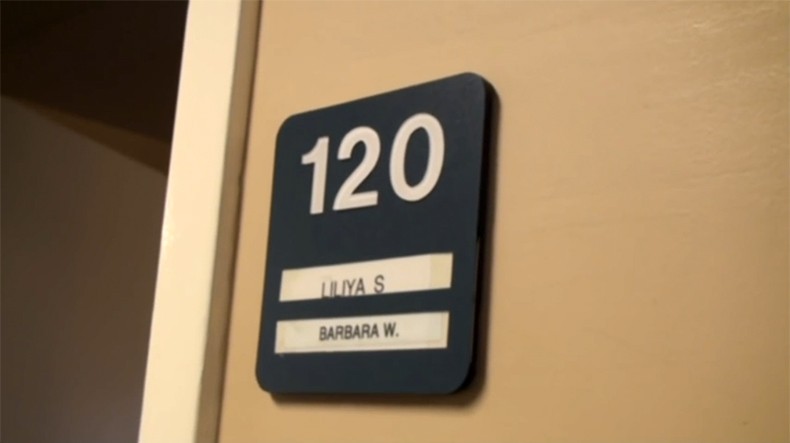
26 years after genocide of Armenians in Azerbaijan: “I spent two years in hostage, in nightmarish conditions”
Panorama.am has already reported that a collection book Baku Tragedy: Eyewitness Accounts is to be published in the frameworks of the project Ordinary Genocide. It is going to include the interviews of about 50 refugees currently living in the US who speak about their memories. ‘A Century-Long Genocide. Black January of Baku, a film, whose presentation took place a year ago, was made based on those accounts.
To commemorate the 26th anniversary of the genocide of the Armenians in Baku, Panorama.am goes on publishing chapters from the future book, provided to the website by Marina Grigoryan, the manager of the project an Ordinary Genocide.
Lilia SAHAKOVA. Lived in flat 114, 11 Nagornaya Str., Baku
OG: Were you born in Baku?
LS: Yes. And my parents as well. My mom’s father was born in Shushi. He lost his first family during the first pogroms at the beginning of the 20th century. He went home and found the house on fire, and the Turks had taken away his wife and son. Once we met the name Aleksander Ter-Ionnisyan, a professor from Iran. It is possible that he can be his son, but all the ties are lost. For the second time in our family, my grandmother on the father’s side became a refugee with her whole family when she was still a child. And now, it was the third time that we became refugees.
OG: Did you live in Baku with your parents?
LS: Yes, with parents, with mom and dad.
OG: How old were you in 1988?
LS: I was born in 1957. I already had a son. He was born in 1979. His name is Armen.
OG: Is he here now?
LS: Yes.
OG: Tell us, please, do you remember the events, which took place in Sumgait in 1988? What changed in Baku after that tragedy? How did the circumstances change? How did you feel that?LS: Yes, we felt those changes. They started to inquire about the lists in the Housing Offices looking for Armenian residences. Ongoing protests, demonstrations started along our street when my son was still a child. He stood on the balcony and looked as the infuriated crowd was going. They talked in Azerbaijani to those they met on their way, and if someone failed to answer correctly, the beating immediately started. The beatings of men were especially severe. I worked as a nurse at the hospital of oil workers. Once at night, during my night shift, they raped me. They knew that I was Armenian. I went to give injections, and one of the patients (he was lying in a separate ward, he was the manager of Azneft, in short, he was a ‘grand person’) threw himself on me and raped me. It was in 1989.
OG: Did you report that?
LS: I did. The senior physician told the chief physician about that. They allegedly discharged that type but he came back the next day. He came to apologise, brought flowers but it did not pay for his guilt.
OG: You mean he was punished?
LS: Of course, not.
OG: How did the events further develop?
LS: We heard anti-Armenian speeches during the meetings. Then the Armenians started to be dismissed from their works, their working hours were cut or they were ordered to do more dirty work, the nurses, for example. The Azerbaijani women were especially infuriated. Our colleagues several times told me and another Armenian nurse that they would kill us, they would slaughter us with a knife with a great pleasure. This continued until January 1990.
OG: That is to say, you lived in Baku in those circumstances until the culmination of the pogroms. Did you work all that time or were you fired?
LS: No, I didn’t work anymore. I left my work, but couldn’t leave the country because of my father. He worked at a very high post in Baku and the Popular Front chased him, they wanted to take him away. And I had many acquaintances in the Internal Ministry – my former patients – and wanted to help him leave. That is why I stayed in Baku until the black January. Once, immediately after the Old New Year, I went out early in the morning and saw corpses all around…
OG: Didn’t anyone warn you about the pogroms?
LS: No. Once in December, I was sitting at my home, and someone knocked at the door. I looked through the peephole and saw a huge crowd behind the door. They asked me, “Are you Armenian?” and called my surname. At that moment, the telephone rang. It was a friend of mine from the Internal Ministry. I was saved thanks to him on that day. Well, they had come to my flat knowing that Armenians lived there, they had the addresses in their hands. I answered them that no, I’m not Armenian. They asked my where the Armenians were, and I answered, “Yokh” [“No”]. I wanted to gain time until my friend came very quickly. Talking in Azerbaijani, he took me out of the flat, and the car was already waiting for me there. I was just very lucky, because they had broken into the houses of all our Armenian neighbours, made pogroms there, looted, threw things out to the street.
OG: Have you witnessed certain cases of attacks?
LS: Yes. I saw from my balcony how they were throwing things, briefcases into the yard; I heard a woman scream, “Help! They are raping me!”
OG: Was someone among your neighbours or Armenian friends killed or abused?
LS: Many were abused but I can’t remember names right now. My husband was lost. I still don’t know what happened to him. He left for Yerevan through Karabakh. It was in 1988, after Sumgait. He went to buy a flat and take us out of Baku. But he did not reach Yerevan. His car was found burnt but I haven’t seen his body so far. His death certificate was issued already in Russia. We were looking for him through courts but we weren’t success. He is considered a missing person. His name was Nikolay Grigoryan. I have hoped all this time that my husband is alive. He may appear after you write about me.
OG: What happened next?
LS: I lived at my friends’ place for several days. Then I was taken to the port to send me on the ferry with other Armenians who were still remaining in Baku. They didn’t allow us to leave on a ferry. It was on January 21. I remember it very well because it is my birthday.
OG: Well, and did you go out of home before January 21?
LS: No. I only saw from the balcony how that brutal crowd was raiding all around, shouting “Death to the Armenians!”, “Clear off, Armenians!”
OG: And what happened at the port?
LS: They did not let us get on the board and left us to wait in that facility until there was a permission to leave. The people were in an awful plight. The children were crying; there was nothing to eat. There were many mixed marriages, where the wife was Armenian and the husband was Azerbaijani, or vice versa. As I spoke a good Azerbaijani, I went to the canteen and demanded food. They answered me, “Do you think we are not human? We also want to give something to eat
to the children but we don’t have the right. The Popular Front is standing here. They will shoot us if we help you.” And we sat hungry… Then we were taken from the port in an unknown direction.
OG: Didn’t they tell you where they were taking you?
LS: They said nothing. They were youngsters from the Popular Front.
OG: Were they armed?
LS: Yes. They had assault rifles. And if they didn’t like someone, they shot.
OG: Did they kill anyone?
LS: Not that I saw.
OG: Were there children with you?
LS: Yes. And there were not only Armenians there but also Russian soldiers with families. We were kept in a shed-like place. Every day they came and told one of the women, “Today you.” They took her away and raped.
OG: You mean, systematically? Every day?
LS: They. They all had smoked something. They raped everyone, irrespective of the age, including old women of 50 or 60 years, though they preferred the young ones, of course. There were 12 or 13 year-old-girls, the Russian soldiers’ daughters. They didn’t mercy them either. Once they tied a teenage girl’s parents and cruelly raped her in front of their eyes. The mother lost her reason, and the father died of myocardial rupture right there.
OG: Did they feed you?
LS: They gave us water. Brought some buns… The conditions were nightmarish. We had stinking hay instead of beds. I couldn’t even have a bath for two years because we could wash ourselves only in the river, at everyone’s sight. And as soon as they saw even a partly naked body, the things started. Two years in the same clothes, in the same skirt, in the same underwear…
OG: How many people were there?
LS: Approximately 25. Russian families, Armenians from mixed-marriage families, those who wanted to leave on the ferry. We were constantly held at gunpoint. And we soon understood that we’d better keep silent if we wanted to live.
OG: Didn’t they tell you what they wanted to do with you?
LS: They wanted to exchange us for their people, those detained in Nagorno Karabakh.
OG: Did they beat you?
LS: Of course, they did. I lost practically all of my teeth there. When I came back, my hair was felling out in clumps, and my teeth fell out, too.
OG: How did you manage to get out of that hell?
LS: I spent you years practically in hostage, and then I can say I had luck. Someone from the Popular Front, rather a grown-up person, arrived. He noticed me, I don’t know why. Well, I was young and beautiful back then, I looked different from what I look now. And he wanted to marry me. He told those guards, “What have you done to her? Don’t touch her, I will take that woman.”
He turned out to be rather a decent man. He really took me away from that place and brought to his home. He already had three wives (they still had the practice at that time). His mother lived there, as well. It was a very pious family. They met me well, they didn’t touch met, they gave me something to drink, to eat, to dress. I was like his wife, but I didn’t live with him because I saw his three wives who could kill me any moment. I told them I didn’t need him and asked them to help me run away. I slept with them in the same room, with those women.
You know, once at his home, I saw some film made in Sumgait. It was a horror. To be more precise, it was not a film but a video footage. There were frames how they rushed into the Armenian flats, killed, raped. I can even remember, they showed a car, Volga-21, and an undressed and raped girl all in blood. They placed her in the front seat of a car as a wedding doll… They watched the videocassette with friends from the Popular Front, and I started to watch it with them, but then I felt unwell and went away. He understood and didn’t even call me back. It was awful…
OG: Did the family know that you are Armenian?
LS: Yes. Everyone knew, the whole family. He had five brothers and ten sisters. It was somewhere in summer of 1992. His wives saw that I wasn’t interested in him at all and made friends with me. He brought a sheikh so that I changed my religion and he could marry me. And here I decided to use purely woman-like tricks. I asked him to give me the chance to give my son a farewell for the last time. And he sent me to Russia in the hope that I would go back. But I didn’t. I called him and told him honestly that I couldn’t. He answered that if that was the God’s will, then, let it be.
I first went to my father in Kostroma, and from there I went to Moscow, to my aunt. My relatives had been looking for me for a long time and thought I was dead. And when I saw them all, when I realised I was already in freedom, I fell in collapse.
OG: Do you know what happened to the people who remained hostage?
LS: I think they killed them. Or exchanged… People lived in terrible conditions there and could not go on for long like that.
OG: Did you feel the consequences of those two years on your health, on your physical state in Moscow?
LS: I was always frightened. I acquired many phobias. For instance, I couldn’t bear when someone suddenly touched me when passing by… My aunt worked at the Kremlin Hospital and showed me to the doctors. They prescribed me isolation from people for half a year because I was just terribly afraid of everything. It always seemed to me that someone was standing behind the curtains, behind the door. I went into hysteria at the sound of the cars going by. I seemed to me that they had come after me. It was all terrible, of course…But when I arrived in America in 1993 with my father and son, everything seemed to be over. Everything seemed to be all right at first. I started to work; I had a beauty salon of my own. But one fine day, I couldn’t get up from my bed. Then my whole body went out of shape, my legs, hands, back, waist were taken away. The doctors think it looks like rheumatoid arthritis but the analyses show I’m absolutely healthy physically. It’s just… they threw me on the ground when they raped me. Maybe that’s why my spine finally refused to work… So, now its seven years I’ve been lying like this, motionless. I live on steroids; that’s why I’m all swollen.
OG: So, you think that it’s the consequence of what you experienced?
LS: Yes, it’s connected with those years. I’m still having nightmares at night, psychiatrists still work with me. I can’t watch films with scenes of violence, murders, shooting, screams of women… I still see some odd and scary dreams, and no psychiatrist can help me…
OG: Is your family here with you?
LS: Yes. Armen married Oksana. She is from Baku, too. We used to be neighbours. They are childhood friends, they used to go walking together. I knew her mother. Then we lost each other and Armen was looking for her for a long time. He found her through the Internet. She lived in Moscow. I was already sick by then. He went after her; they met in Yerevan and got engaged. Now they have two daughters, my granddaughters. They often visit me.
OG: Tell us, please, what property did you leave behind in Baku?
LS: We left two good flats and our whole possession. Completely. We took nothing.
OG: Did you keep in touch with your saver?
LS: I sometimes talked to him on the phone. Once he came to Moscow and we met. He wanted to buy our flat for his son. I refused to take money, I wanted to give my flat to him as a present for saving me but he said he wouldn’t take it because God would punish him. He bought it and left. Later, when I learnt that he had fallen ill, I called him from here, from America. He needed medicine, diapers… There were no such things in Baku back then. And I sent him everything through those who flew to Moscow. I helped him how I could. So, I’m pure before God.…I often think that in a certain period in a century, we, the Armenians, are subjected to something of this sort, but no one wants to acknowledge that…
Seattle, Washington, US. 29.03.2014.
A mass pogrom of Armenian population was committed in Baku from 13 to 19 January 1990 as a culmination of the genocide of the Armenians in Azerbaijan unfolded between 1988 and 1990. After the Sumgait pogroms (26-29 February 1988), persecutions, beatings, particularly cruel killings, public mockeries, pogroms of separate flats, seizure of property, forcible expulsions and illegal dismissals of Armenians started in Baku. Only some 35 or 40 thousand Armenians of the community of 250 thousand remained in Baku by January 1990; they were mainly disabled people, old and sick people and the relatives looking after them. The pogroms took an organised, targeted and mass nature since 13 January 1990. A large amount of evidence exists about the atrocities and killings committed with exceptional cruelty, including gang rapes, burnings of people alive, throwing people out of balconies of higher floors, dismemberments and beheadings.
The exact number of the victims of the genocide of the Armenians in Baku still remains unknown. According to different sources, between 150 and 400 people were murdered, and hundreds were left disabled. The pogroms went on for a week amid a total inaction of the authorities of Azerbaijan and the USSR, as well as the internal troops and the large Baku garrison of the Soviet Army. Those who managed to avoid death were forced into deportation. The Soviet troops were deployed to set order in Baku only on 20 January 1990.
For more detail, visit KarabakhRecords
Related news
- 26 years after genocide of Armenians in Azerbaijan: “I remember Baku and again feel smell of burnt human flesh…”
- “This is impossible to forget and to forgive”: A Century-Long Genocide. Black January of Baku film demonstrations in US
- 26 years after genocide in Baku: “They called and threatened to finish off with us as they had done with our niece in Sumgait”
- 26 years after genocide in Baku: “Baku received order from Moscow not to intervene in pogroms and allow them easily slaughter Armenians”
- 26 years after genocide in Baku: “They marked Armenian flats with crosses to come and attack later”
- 26 years after genocide in Baku: “My mom listened to Sayat-Nova and cried – her father survived Genocide, then she herself became refugee”
- 26 years after genocide in Baku: “They just threw that young Armenian under train”
- 26 years after genocide in Baku: “Someone informed pogromers that young Armenian woman hid in that house, and they came after me…”
- ‘History repeats itself…’ ‘A Century-Long Genocide. Black January of Baku’ film screened in Richmond
Newsfeed
Videos






